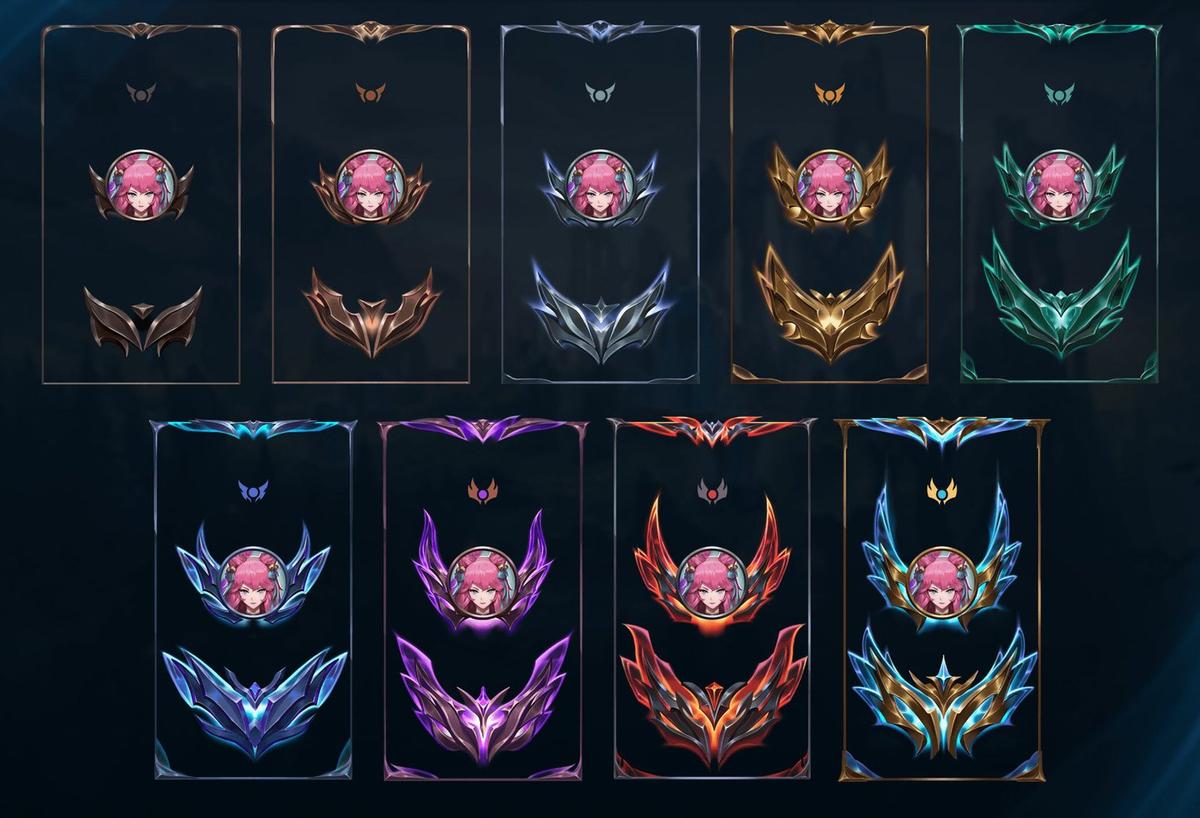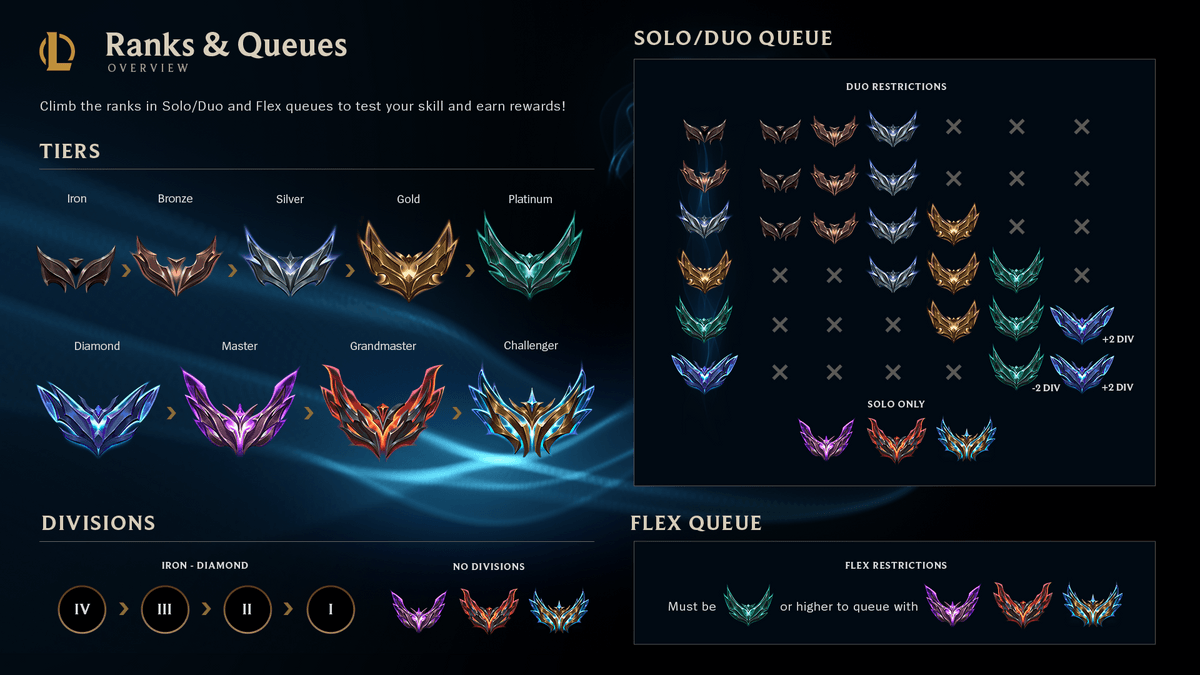A Guide to Climbing the LoL Ladder: What are MMR and LP
There are two formulas closely affecting your ranked climb in League of Legends: Matchmaking Rating (MMR) and League Points (LP). The simplest way to explain them is this: MMR determines what your skill level is and how much LP you win or lose each game. LP, on the other hand, is how you climb up through divisions. Collecting 100 LP promotes you up a division.
We’ll also take a look at the so-called Elo boosting — one of the unfair ways to rank up — and how to avoid it.
Relationship Between MMR, Rank, and LP
The Matchmaking Rating is a numerical expression of how good you are at League of Legends. It’s determined by several factors including your win/loss ratio, the MMR of your opponents, and your recent match history.
While there are certain websites that can show what your MMR is, Riot Games prefer to keep it hidden. Instead, they use a so-called Rank to show what your skill level is. The goal of the matchmaking system is to keep your MMR and Rank more or less equal and your LP gains and losses will change accordingly.
For example, if your MMR is higher than your rank, you will gain more and lose less LP, so you can climb to where the game thinks you need to be. And vice versa: if your MMR is lower than your rank, your LP losses will be bigger so you can drop down to a more adequate bracket for you.
To sum it up:
- MMR = Rank: LP gains and losses are relatively equal
- MMR > Rank: Big LP gains, small LP losses
- MMR < Rank: Small LP gains, big LP Losses
How to Improve Your MMR
Winning games is the more surefire way to improve your MMR. Beating stronger opponents will also expedite your own MMR gain. But you don’t always have to rely on such spikes against opponents that “outclass” you. Maintaining a positive win/loss record will improve your rating over time, you just need time and dedication.
The more you play and learn the game, the more consistent you will become at keeping a positive rating. If you’re a new player, try expanding your champion pool by utilizing the free champion rotation. The more champions you learn, the better you will be at the game.
Here’s an example of how MMR changes affects LP gains and losses:
| Match Outcome | MMR Change | LP Change |
|---|---|---|
| Win | +15 MMR | +20 LP |
| Loss | -15 MMR | -15 LP |
| Win | +20 MMR | +25 LP |
| Loss | -10 MMR | -12 LP |
Sometimes, the game might award you with Consolation LP when you’re in an unfair situation such as losing a game due to a leaver/AFK player.
Our probuilds show LP gains and losses of each match played by a pro.

MMR in Normal Games vs. Ranked Games
Do Normal Games Affect Your MMR? Yes, they do, but your Ranked and your Normal Games MMRare separate and do not affect each other. The benefits of playing normal games is simply the opportunity to practice new champions, refine strategies, and improve your gameplay without risking your Ranked rating.
Of the two, the Ranked MMR is the more important one, as it directly influences your division progression. Normal Rating is simply there to ensure a better casual matchmaking. That said, high-ranked players might still encounter challenging opponents in normal games, as the matchmaking system tries to create balanced matches. Try to remember the primary focus in normal games is to have fun or experiment with different playstyles.
Elo Boosting and Its Consequences
Elo boosting is a practice where a player, typically of higher skill, logs into another player’s account to help them achieve a higher rank. This can lead to an unfair gaming experience for those who face the boosted account, which is why the practice is frowned upon.
Riot takes Elo boosting seriously and there are measures in place to punish it. Abnormal win rates, sudden rank increases, or unusual champion or role patterns might make the developers look closer into your account. If found guilty of Elo boosting, a player could face penalties such as temporary or permanent account bans, loss of ranked rewards, or a reduction to their MMR.
If you suspect a player is Elo boosting, you can also report them.
Elo boosting undermines the integrity of the ranking system, creates an unfair experience for other players, and is taken very seriously by our team. We remain committed to maintaining a fair and competitive environment for all players.

Understanding MMR, Tiers, and Divisions
The most visible expression of a player’s skill is their placement on the Tiers and Divisions ladder. There are currently nine tiers in the game, ranging from Iron (lowest) to Challenger (highest). Each tier, except for Master and above, consists of four Divisions.
This is where the aforementioned League Points come in play. As you win games and accumulate LP, you will get closer to Division promotion. When you accumulate 100 LP, you will enter a promotion series; win it, and rank up. This is where the speed at which you earn LP comes into play and ties everything together: the higher your MMR, the bigger your LP gains, and the sooner you can reach a promotional series.

Conclusion
As we reach the end of our exploration into the world of MMR and LP in League of Legends, we hope you’ve gained valuable insights that will help you on your journey to the top. By understanding the mechanics behind MMR and LP, you can focus on improving your gameplay and climbing the ranks with confidence.
Remember, everyone likes a fair and enjoyable experience. So, avoid the temptations of Elo boosting and strive to improve your skills through dedication and practice. Now that you’re armed with knowledge about MMR, LP, and the ranking system, it’s time to hit the Rift and show the world what you’re made of! Good luck, and may your climb to the top be as thrilling as the game itself!
Frequently Asked Questions
What is MMR in League of Legends?
MMR (Matchmaking Rating) is a hidden numerical value assigned to each player in League of Legends, representing their skill level. MMR is used to match players of similar skill levels in games and helps determine the LP (League Points) they gain or lose after each match.
What is LP and how does it work?
LP (League Points) are points gained or lost after each ranked match in League of Legends. Your LP determines your progress within a particular division and tier. Earning enough LP will allow you to advance to higher divisions and tiers, while losing LP may result in demotion.
How are MMR and LP related?
MMR and LP are related in the sense that your MMR determines how many LP points you gain or lose after each ranked match. Players with higher MMR relative to their current rank will gain more LP for a win and lose fewer LP for a loss, making it easier for them to climb the ranked ladder.
What is the difference between normal games and ranked games?
Normal games are casual matches where players can practice and try new strategies without affecting their ranked standing. Ranked games are more competitive and have a visible ranking system, with players earning LP and progressing through divisions and tiers based on their performance.
What is Elo boosting and why is it banned?
Elo boosting is the act of a higher-skilled player playing on a lower-skilled player’s account to increase their rank in exchange for payment. Elo boosting is banned because it undermines the integrity of the ranking system, creates an unfair experience for other players, and goes against the spirit of fair competition in the game.
How does the ranking system work in League of Legends?
The ranking system in League of Legends consists of nine tiers (Iron, Bronze, Silver, Gold, Platinum, Diamond, Master, Grandmaster, and Challenger) and four divisions within each tier (except Master, Grandmaster, and Challenger). Players earn LP by winning ranked games and lose LP by losing games. When a player earns enough LP, they advance to the next division or tier, while losing too much LP may result in demotion.
How can I check my MMR in League of Legends?
MMR is a hidden value in League of Legends and cannot be directly viewed in the game. However, there are several third-party websites and tools that can provide an estimated MMR value based on your match history and performance. Keep inmind that these estimates may not be entirely accurate and should be used as a rough guideline.
How can I improve my MMR in League of Legends?
To improve your MMR in League of Legends, focus on consistently winning games, improving your gameplay, and learning from your mistakes. MMR will naturally increase as you become a better player and consistently outperform your current skill level.
Does my performance in normal games affect my MMR in ranked games?
No, your performance in normal games does not affect your MMR in ranked games. Normal games and ranked games have separate MMR values, so your normal game performance will not impact your ranked MMR or LP.
What are the consequences of being caught Elo boosting?
If a player is caught Elo boosting, they may face various consequences such as temporary or permanent bans, removal of in-game rewards, and loss of LP and ranked standing. The severity of the punishment depends on the extent of the offense and the player’s history of previous violations.
How does Riot Games detect Elo boosting?
Riot Games uses advanced algorithms and data analysis to identify patterns and behaviors consistent with Elo boosting. They also investigate reports from other players and take appropriate action if they find sufficient evidence of Elo boosting.